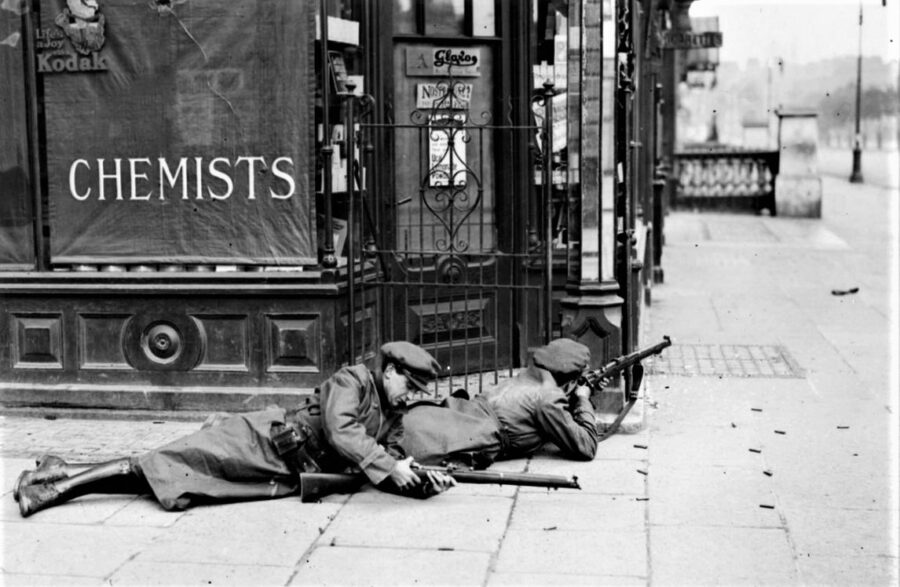
Kieran’s Our City, Our Town Article,
Cork Independent, 14 July 2022
Journeys to a Free State: Calls for Peace
On 17 July 1922 at 12noon a peace conference was summoned at the request of the chairman Frank Daly of the Cork Harbour Commissioners. It was one of the most influential and representative meetings held in Cork for a considerable time. Resolutions were passed demanding a cessation of hostilities across the country and calling upon Dáil Éireann to meet.
Frank Daly, who presided over the meeting was joined by local members of urban district councils from Cobh to Bantry to Mallow, representatives of the city’s two chambers of commerce, from the city’s Corn Market, Board of Guardians and other influential figures from over 45 public bodies in Cork City and County. Frank Daly read a resolution; “Faced with the appalling prospect of a prolonged civil war, with all its moral, national and commercial consequences, and in view of the uncertainty of the political basis and constitutional implications of such strife, we hereby call upon the authorities in Dublin to arrange for an immediate armistice and a conference with their fellow-Irishmen in the South of Ireland”.
Frank outlined that the meeting was a thoroughly representative one. There was no doubt he observed that it was a love of country that brought people to the meeting. He noted: “The situation, as you know, is an extremely grave one, and the future presents an appalling prospect. The outlook is such that all good Irishmen are really heart-broken, and little wonder when they see their country in the actual process of self-destruction, and when they see their loyal comrades and brothers-in-arms of but yesterday engaged in deadly strife. And for what purpose?”
Frank continued to be fearful of the impact of destruction; “In plain, cold simple language the continuation of the fratricidal strife can only mean devastation, destruction and desolation. If this awful struggle continues our fair province of Munster will be, by Irishmen, ravaged, ruined and laid waste. Our own city of Cork, of which we are justly proud, will if this struggle continues, be undoubtedly reduced to ashes, and we may hear at any moment that Waterford is ablaze and that the ancient city of Limerick is by modern artillery blotted out, and the destruction of Clonmel, Tipperary and Tralee will be only a matter of time”.
Frank called for Dáil Éireann to assemble, to call for an armistice and for a stable government to be formed. His resolutions containing the latter calls were to be sent to the press, government, the Chief of Staff and every member of Dáil Éireann. In his conclusions he hoped that in the discussion each and every person would as far as possible, avoid taking the party view of the situation and deal with it from what was best for Ireland.
Mr George Nason, President of the Cork District Trade’s Council, spoke second and called for a truce immediately. He was interested in representing the most unfortunate people in the country, and noted: “What was going on between the contending parties was putting their women and children into a state of starvation. The Labour Party was trying to take similar steps to those suggested at that meeting. We are not saying that the Free Staters were right or that the Republicans were right, but we say both are wrong in acting as they are now. These men on both sides had fought loyally up to quite recently side by side. The greater portion of the armies are of the working class and it was sorrowful and deplorable that the city of Dublin was today almost reduced to ashes, the finest buildings being levelled to the ground, and who is going to pay for damage, which is being done by Irishmen to their own country”.
Sir John Scott, an elder councillor of Cork City Council called for the new government to meet; “We are all anxious that peace and prosperity should come to their land. Business was paralysed. Starvation was coming, and ruin would be soon amongst them”.
Cllr Barry Egan stood up and observed that there was truth and a certain amount of justice on both sides, and he wanted to call these people together. He noted; “let them not to forget once and for all the opinions were not principles. There were only the ten commandments. They were the only principles he knew of, and it was time that those principles should prevail”.
Liam De Róiste TD stood up to speak and noted that he was there is a listening capacity. He commented on the use of guns across the emerging civil war; “If this rule of men with guns against unarmed men continues, there is an end to all Christian civilisation in this day…if they were going to have liberty in the country, liberty of the individual to live his life as he can or may, if we are going to have political liberty in the country, or economic liberty it must be by the whole people of Ireland recognising, every section recognising that progress must be upon constitutional lines within Ireland itself. The fight against the armed aggression of England was justifiable and would be justifiable any time. But a war between Irishmen themselves is, in my view and conscience, not justifiable”.
Seven other speakers spoke including Robert Day TD. There were minor amendments to Frank Daly’s original resolutions but all were sent to the agreed list of recipients. There was also a provisional committee for peace set up, which drew from interested attendees.
Caption:
1159a. National Army snipers, Henry Street Dublin, July 1922 (source: National Library, Dublin).
Kieran’s Upcoming July Tour:
Saturday 16 July 2022, The Battle of Douglas, An Irish Civil War Story, historical walking tour with Kieran, from carpark and entrance to Old Railway Line, Harty’s Quay, Rochestown; 2pm, (free, 2 hours, finishes near Rochestown Road).